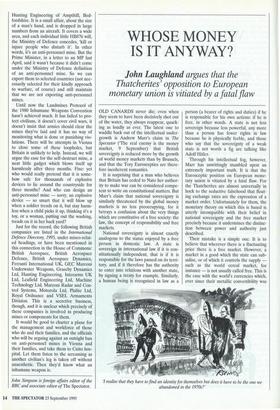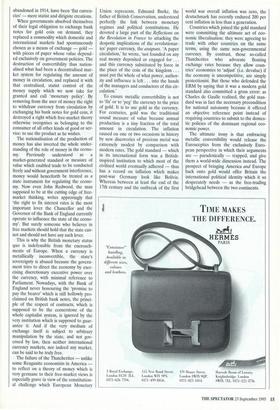WHOSE MONEY IS IT ANYWAY?
John Laughland argues that the
Thatcherites' opposition to European monetary union is vitiated by a fatal flaw
OLD CANARDS never die; even when they seem to have been decisively shot out of the water, they always reappear, quack- ing as loudly as ever. The latest one to waddle back out of the intellectual under- growth is Andrew Marr's claim in The Spectator (The real enemy is the money market, 9 September) that British sovereignty is reduced more by the growth of world money markets than by Brussels, and that the Tory Eurosceptics are there- fore incoherent romantics.
It is surprising that a man who believes that Britain has ceded to Nato her author- ity to make war can be considered compe- tent to write on constitutional matters. But Marr's claim that national sovereignty is similarly threatened by the global money markets is no less preoccupying, for it betrays a confusion about the very things which are constitutive of a free society: the law, the concept of responsibility and free markets.
National sovereignty is almost exactly analogous to the status enjoyed by a free person in domestic law. A state is sovereign in international law if it is con- stitutionally independent, that is if it is responsible for the laws passed on its terri- tory, and if it therefore has the authority to enter into relations with another state, by signing a treaty for example. Similarly, a human being is recognised in law as a person (a bearer of rights and duties) if he is responsible for his own actions: if he is free, in other words. A state is not less sovereign because less powerful, any more than a person has fewer rights in law because he is physically feeble, and those who say that the sovereignty of a weak state is not worth a fig are talking like Adolf Hitler.
Through his intellectual fog, however, Marr has unwittingly stumbled upon an extremely important truth. It is that the Eurosceptic position on European mone- tary union is vitiated by a fatal flaw. For the Thatcherites are almost universally in hock to the seductive falsehood that float- ing exchange rates are the expression of a market order. Unfortunately for them, the monetary theory on which this is based is utterly incompatible with their belief in national sovereignty and the free market precisely because it undermines the distinc- tion between power and authority just described.
Their mistake is a simple one. It is to believe that wherever there is a fluctuating price there is a free market. However, a market in a good which the state can sub- sidise, or of which it controls the supply such as the world cereal market, for instance — is not usually called free. This is the case with the world's currencies which, ever since their metallic convertibility was 7 realise that they have to find an identity for themselves but does it have to be the one we abandoned in the 1970s?' abandoned in 1914, have been 'flat curren- cies' — mere statist and dirigiste creations. When governments absolved themselves of their legal obligation to exchange bank notes for gold coin on demand, they replaced a commodity which domestic and international markets had spontaneously chosen as a means of exchange — gold - with pieces of paper whose value depend- ed exclusively on government policies. The destruction of convertibility thus nation- alised what had been a decentralised mar- ket system for regulating the amount of money in circulation, and replaced it with that centralised, statist control of the money supply which we now take for granted and call 'monetary policy'. By removing from the user of money the right to withdraw currency from circulation by exchanging his bank notes for gold coin, it destroyed a right which free-market theory otherwise recognises as belonging to the consumer of all other kinds of good or ser- vice: to use the product as he wishes.
The nationalisation of the production of money has also inverted the whole under- standing of the role of money in the econo- my. Previously understood as a market-generated standard or measure of value which enabled trade to be conducted freely and without government interference, money would henceforth be treated as a state instrument for regulating the econo- my. Now even John Redwood, the man supposed to be at the cutting edge of free- market thinking, writes approvingly that `the right to fix interest rates is the most important lever the Chancellor and the Governor of the Bank of England currently operate to influence the state of the econo- my'. But surely someone who believes in free markets should hold that the state can- not and should not have any such lever.
This is why the British monetary status quo is indefensible from the encroach- ments of Europe. When a currency is metallically inconvertible, the state's sovereignty is abused because the govern- ment tries to direct the economy by exer- cising discretionary executive power over the currency, with minimal reference to Parliament. Nowadays, with the Bank of England never honouring the 'promise to pay the bearer' which is still hollowly pro- claimed on British bank notes, the princi- ple of the respect of contracts, which is supposed to be the cornerstone of the whole capitalist system, is ignored by the very institution which is supposed to guar- antee it. And if the very medium of exchange itself is subject to arbitrary manipulation by the state, and not gov- erned by law, then neither international currency markets, nor indeed any market, can be said to be truly free.
The failure of the Thatcherites — unlike some Reaganite economists in America to reflect on a theory of money which is very germane to their free-market views is especially grave in view of the constitution- al challenge which European Monetary Union represents. Edmund Burke, the father of British Conservatism, understood perfectly the link between monetary regimes and political constitutions. He devoted a large part of the Reflections on the Revolution in France to attacking the despotic implications of the revolutionar- ies' paper currency, the assignats. 'A paper circulation,' he wrote, 'not founded on any real money deposited or engaged for . . . and this currency substituted by force in the place of the coin of the kingdom . . . must put the whole of what power, author- ity and influence is left . . . into the hands of the managers and conductors of this cir- culation.'
To ensure metallic convertibility is not to 'fix' or to 'peg' the currency to the price of gold. It is to use gold as the currency. For centuries, gold was the traditional sound measure of value because annual production is a tiny fraction of the total amount in circulation. The inflation caused on one or two occasions in history by new discoveries of precious metal was extremely modest by comparison with modern rates. The gold standard — which in its international form was a British- inspired institution to which most of the civilised world eventually adhered — thus has a record on inflation which makes post-war Germany look like Bolivia. Whereas between at least the end of the 17th century and the outbreak of the first world war overall inflation was zero, the deutschmark has recently endured 200 per cent inflation in less than a generation.
Countries which joined the gold standard were committing the ultimate act of eco- nomic liberalisation: they were agreeing to trade with other countries on the same terms, using the same non-governmental currency. By contrast, those so-called Thatcherites who advocate floating exchange rates because they allow coun- tries' economies to 'adjust' (i.e. devalue) if the economy is uncompetitive, are simply protectionist. But those who defended the ERM by saying that it was a modern gold standard also committed a gross error: as Charles de Gaulle realised, the gold stan- dard was in fact the necessary precondition for national autonomy because it offered an objective reference point instead of requiring countries to submit to the domes- tic policies of the dominant regional eco- nomic power.
The ultimate irony is that embracing metallic convertibility would release the Eurosceptics from the exclusively Euro- pean perspective in which their arguments are — paradoxically — trapped, and give them a world-wide dimension instead. The prospect of bringing America and Europe back onto gold would offer Britain the international political identity which it so desperately needs — as the free-trading bridgehead between the two continents.



































































 Previous page
Previous page